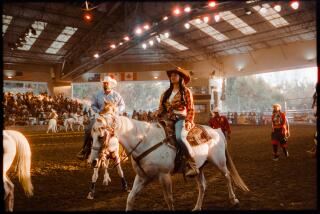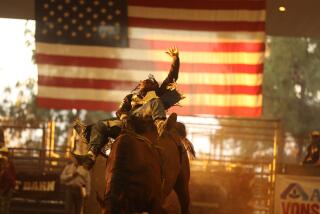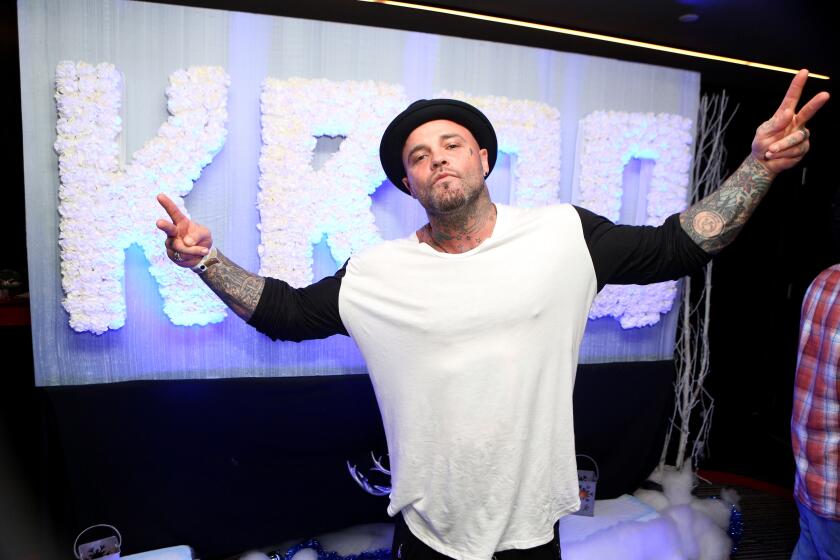Nothing dims Bill Callahan’s red-white-and-blue view
In the last five years, singer and songwriter Bill Callahan has been making nouveau cowboy music, the kind that might have soothed his former self, the confessional, acerbic zinemaker who released tapes made out of his bedroom in the early ‘90s and went by the very unfriendly moniker Smog. But that was a long time ago.
These days Callahan presents himself as a kind of pioneer, a picture of rugged individualism and other American myths that have become recurrent themes in his work as he has grown older. Throwing off the shackles of his early work, which was often self-consciously lo-fi, Callahan, now 45, has settled into a stately elegance, carving out space around his cinematic and often dry-witted narratives. He’ll showcase them when he appears at the Troubadour on Thursday night.
But, then, horses appear frequently in his work, and always have. On early roughshod songs like “I Break Horses,” the equine served as a troublesome metaphor for a man’s callous treatment of women. Later, on 2005’s “A River Ain’t Too Much to Love,” Callahan took another tack, closing out the album with the romantically loping “Let Me See the Colts,” where the animals are as captivating and mysterious as the landscape in a John Ford film. His acclaimed new album, “Apocalypse,” is a suite of songs that explores the West, and might be his most conceptual album yet. “The basic sense of the record is of someone on a quest, and then some type of resolution,” the reserved Callahan explained in a recent interview from his home in Austin, Texas.
Like most of Callahan’s records, it’s a snapshot of where his fascinations are at the moment, something divined from an internal compass. “It can be on a whim, your changing desires of what you want to do,” he said. “I tend not to question that very much. I make the record I feel like making at the time.”
“Apocalypse” explores the version of America that’s a vista of possibility, the kind, as Callahan sings in the opening song, that demands but can also break a strong mind. It’s both a defense and a humble bow to its hardships, brought about from the last few years of touring and encountering foreign hostility toward his native land.
“After 9/11 and Iraq,” Callahan said, “as a touring musician, you get a lot of unasked for things about your country. It just seemed like the whole world was ganging up on America. I would just want to say that it’s not that bad, that it’s probably as good as your country.”
In one song, “America!” that Callahan described as a “pep talk gone a little bit wrong,” he sings, “Afghanistan! Vietnam! Iran! Native Americon! America! Everyone’s allowed a past they don’t care to mention.”
Callahan’s own musical past — ambitious and prolific but patchy and raw — reveals that he’s always followed an individual path. Rian Murphy, director of sales at Drag City, Callahan’s longstanding home label in Chicago, played drums for Callahan on some tours in the early and mid-’90s. He remembers not really knowing where Callahan wanted to go musically but being impressed with the fortitude of his vision nevertheless.
“You just had to strap down and say wherever he’s going, I’m going too,” Murphy said. “Even early on, it was clear that it was Bill’s way or the highway. But it was delivered with such aplomb and there was never a sense that he had any doubt.”
Looking forward, Murphy said, “Bill at 70 will probably be similarly inclined that he can do it however he wants, as he has at any point in his career. It just isn’t written yet. We just have to wait and see.”
Whatever challenges he’s posed as a musician bent on capturing the latest iteration, it seems to also yield rewards for those who work with him. Callahan wrote “Apocalypse” over 21/2 months and recorded it in Tornillo, a Texas border town, in a few days. Some of the songs required several attempts to try and get it right.
Drummer Neal Morgan recalls that “Drover,” the opening track, was a particularly prickly beast but through experimentation, they found the right expression. Morgan’s percussion has the skittering steps of spooked cattle, rushing in sometimes but for the most part, scaring away.
“Bringing that song to its final conclusion,” Morgan said, “was one of the most rewarding moments of my career. Part of what makes Bill a great person to work with is he is incredibly trusting and supportive of my impulses and instincts related to his work.”
For all the value Callahan might place on his idiosyncrasies, it’s not without an effort to be universal. His vision is his, but he’s also cutting a clearing so that everyone else can see. “I’ve moved away from writing the personal,” he said, “though it’s hard to really say what’s personal. Most of all, I’m trying to make songs that will last, something that more people can appreciate.”
More to Read
The biggest entertainment stories
Get our big stories about Hollywood, film, television, music, arts, culture and more right in your inbox as soon as they publish.
You may occasionally receive promotional content from the Los Angeles Times.










